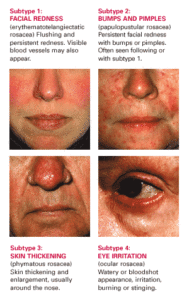Rosacea
What is Rosacea?
Do you have flushing or chronic facial redness? Do your cheeks sting? Are there small visible blood vessels on your cheeks, nose or forehead? Do you get pimples or whiteheads on your cheeks or nose? Are your eyes dry, red and irritated? Are you noticing thickening of the skin on your nose?
These are common symptoms of rosacea, a problem affecting more than 15 million Americans. If you’ve been diagnosed with rosacea, or suffer from some of the symptoms described above, this page is for you.
A rosacea flare-up can be annoying and uncomfortable. While there is no cure, rosacea can be successfully managed with help from a dermatologist. Famous faces, such as Bill Clinton, Cameron Diaz and Mariah Carey battle their rosacea and control their rosy, red cheeks; so can you! Sex and the City star, Cynthia Nixon, talks about her rosacea in a series of videos at http://www.rosaceafacts.com.

What Causes Rosacea?
The exact cause of rosacea is unknown. The condition is found equally among men and women, and more frequently in those with a fair complexion, over the age of 30, or with a family history of rosacea. Symptoms can wax and wane, but without treatment the condition can worsen, leading to irreversible changes in the skin. The bulbous nose of W.C. Fields is the most famous example of unchecked rosacea.
What Causes Flare-Ups?
The first step in managing your rosacea is to identify things that trigger your rosacea to flare. A flare is a period of time when your symptoms of facial redness, bumps, swelling, and stinging are worse. These triggers are different for everyone, so learning which causes your rosacea to flare is a key first step in managing your symptoms. Common triggers include alcohol, warm and humid weather, exercising, spicy foods, hot beverages, stress, some medications, heat and sun exposure. Avoidance of these triggers will help to decrease the frequency of flares, the redness of your face and other symptoms.
How Can I Prevent Flare-Ups?
Strategies for avoiding and managing your unique triggers include:
- Wear a hat to protect your face from the sun, and keep it cool
- Avoid outdoor work and exercise in hot and humid weather
- Ventilate the kitchen when you cook
- Exercise when and where it is cool (early morning, evening, or in an air-conditioned gym)
- Avoid alcoholic beverages and hot beverages (or know that these may cause some redness)
- Be cautious with eating heavily-spiced dishes
- Avoid saunas, very hot showers, hot baths
- Refrigerate your moisturizers and use oil-free, non-comedogenic (non-clogging) products
- Manage stress with relaxation techniques that work for you (visualization, yoga, meditation, listening to calming music)
- Get enough sleep
It is also important for you to protect your face from sun exposure and irritating cosmetic products to prevent further irritation and redness. Tactics to accomplish this include the utilization of the following:
- Soapless cleansers (e.g., Cetaphil or Cerave)
- Avoidance of facial exfoliants/scrubs and harsh toners
- Hypoallergenic and oil-free make-up products
- Daily moisturizer with SPF 30, broad-spectrum sunscreen (UVA/UVB) preferably with titanium dioxide or zinc oxide, as well as a hat
- Sunglasses
- Avoidance of extended sun exposure between 10am-2pm
What Treatments are Available for Rosacea?
Avoiding triggers will improve your rosacea, but other treatments are often needed to help manage your symptoms. These treatment options are varied and depend upon several factors, including what type of rosacea you have, whether there is eye involvement, your lifestyle, and your medical history. A combination of an oral antibiotic (such as doxycycline) and topical prescription medications (sulfur based, metronidazole, azelaic acid) are frequently used to control the redness and inflammation with great success. In addition, laser treatment for rosacea and superficial blood vessels on the face can be very helpful. The Vbeam pulsed dye laser can significantly improve the vessels caused by rosacea with minimal recuperation time, and decrease other symptoms of rosacea with multiple treatments.
So what does all this information mean for you? Can your rosacea be remedied? With the appropriate skin care regimen, avoidance of triggers and a tailored treatment plan developed by you and your dermatologist, your rosacea can be successfully controlled. With appropriate care, you can face the world with your eyes a little brighter – and cheeks a little less rosy!
Visit the National Society of Rosacea for additional information and support at http://www.rosacea.org.

